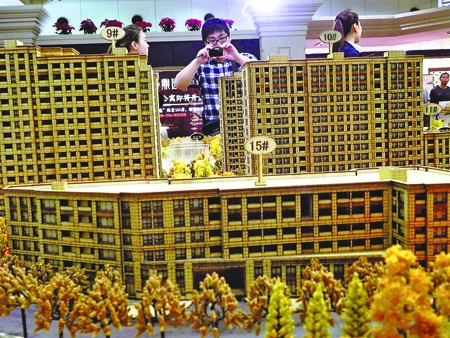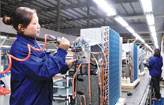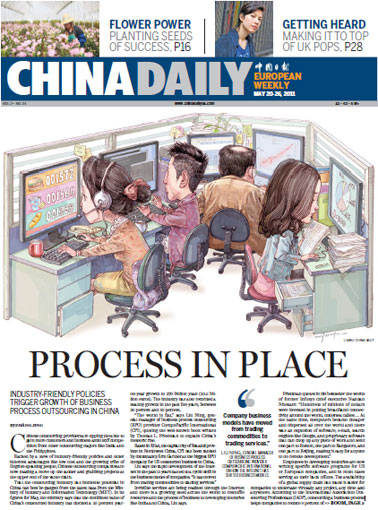Money
Lending curbs hit nation's property developers
Updated: 2011-05-21 09:58
By Henry Sanderson and Bonnie Cao (China Daily)
|
 |
|
A real estate project on display in Hangzhou, Zhejiang province. Chinese developers are paying as much as 25 percent to borrow from private trust companies to avoid lending curbs. [Photo / China Daily] |
BEIJING/SHANGHAI - China's developers are paying as much as 25 percent to borrow from private trust companies. That's as property firms avoid lending curbs intended to control inflation and cut the risk of corporate default.
Deprived of bank loans by government policies, developers pay between 16 percent and 25 percent to borrow from trusts and skirt lending restrictions to the real estate sector. That's according to an official at the Beijing-based National Trust, who asked not to be identified as he isn't authorized to speak to the media. The rate compares unfavorably with the People's Bank of China's one-year lending rate of 6.31 percent.
While the government has targeted property speculation to control inflation that reached an annualized 5.3 percent last month, home prices in April rose in 67 of 70 cities from a year earlier. The 25 percent paid by some Chinese developers compares with a 5.8 percent yield on Los Angeles-based KB Home's dollar-denominated notes due in January in 2015.
Standard Chartered Plc estimates Chinese developers are paying interest and fees totaling between 17 and 20 percent to borrow from trust companies, according to a May 17 research report. Trusts typically take deposits from individuals, or raise cash from wealthy people and companies and then invest the proceeds.
"The continued willingness of many developers to seek this funding shows how difficult it is to get loans from banks," analysts at the firm wrote in the report, citing interviews with officials at three large- and medium-sized trust companies in Beijing. "Developers are thirsty for funds and are willing to pay."
About 44 percent of the value of trust products sold to wealthy individuals and companies in the four months through April were linked to property investments, according to Standard Chartered, citing data compiled by Use Trust, a Nanchang-based consultancy. Trusts boosted sales of property-linked investments by 36 percent from a year earlier to 38 billion yuan ($5.9 billion) in the first quarter to fund investments, the data show.
"If it's easy to get loans from banks, why would the developers come to get high-cost financing from trusts?" asked Mr Liu, a manager in charge of the real estate business at non-bank lender National Trust. Liu asked to be identified only by his surname because the issue is sensitive. "They need to get their buildings done, so they have to get money. You can't just leave the buildings halfway finished," he said.
China increased major lenders' reserve-requirement ratios by 50 basis points, or 0.5 percentage point, to a record 21 percent, starting on May 18, after raising interest rates four times since September to curb surging prices. Premier Wen Jiabao said in March that "exorbitant" home-price increases are a top public concern.
Non State-owned companies are forced to pay more for funds than their State-owned counterparts, according to Chen Zhiwu, a finance professor at the New Haven, Connecticut-based Yale School of Management. "The private economy suffers a lot because of this two-track interest rate" system, said Chen at a conference in Shanghai on Thursday.
Bloomberg News
E-paper

Thawing out
After a deep freeze in sales during the recession, China’s air conditioner makers are bouncing back
Cool Iron lady
Of good and evil
Build on security initiatives
Specials

Memory lanes
Shanghai’s historic ALLEYS not just unique architecture but a way of life

Great expectations
Hong Kong-born singer songwriter rises to the top of the UK pops.

A diplomat of character
Belgian envoy draws on personal fascination to help build China ties.




